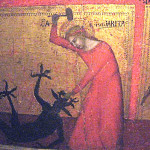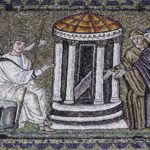We run our website the way we wished the whole internet worked: we provide high quality original content with no ads. We are funded solely by your direct support. Please consider supporting this project.
Confronting Divine Determinism
Part of the fallen human condition inclines us to shirk our moral responsibility and accept that everything is predetermined, whether by God, the gods, fate, or blind chance. Various forms of determinism have been prevalent in most primitive religions, in much ancient philosophy, in most forms of Islam and even, most surprisingly, in much traditional Christian theology. [For a brief analysis of this deterministic view of God, click here.]
This belief in fate or divine determinism is as tragic as it is unbiblical. Among other things, fatalism inevitably leads people to blame God for evil. If God is the ultimate cause of everything, how could this conclusion be avoided? Moreover, by undermining our freedom of choice, determinism strips us of our dignity and moral responsibility. It reduces us to pawns of fate and robs us of our potential to love. In other words, it destroys the beauty of the biblical proclamation that we are made in the image of God.
While it’s undeniable that the Bible depicts God as predestining some things, it’s also clear that free decisions do not fall into this category. To a significant extent, humans freely determine their own destiny. And the first step in understanding how an all-good God could create a world that is as messed up as the one we find ourselves in is to fully appreciate this fact.
If God does not determine everything and humans have free will we must ask this question: how does human free will fit in with God’s plan?
We can think of free will as our capacity to have “say-so” in the world. That is, by our free choices, God grants us a genuine “say” in what comes to pass. This “say-so” is our domain of responsibility. We might even call it our own kingdom, since a kingdom is any domain over which someone is king.
God’s goal for us is for us to align our “say-so” with his and thereby to make our kingdom his Kingdom. To the extend that we do this, God’s fullness of life is poured into us and we use our “say-so” as a means of expressing God’s “say-so.” God’s will now begins to be accomplished “on earth as it is in heaven.” As the domain of responsibility given to humans becomes yielded to God, humans and the whole earth that has been entrusted to us becomes a domain over which God reigns, the Kingdom of God.
Yet, because the goal of the whole project is love, none of this can be coerced. Before creating the world, the omnipotent God had all the “say-so” there was. The moment he decided to create humans and angels as free agents, however, his “say-so” became limited to some extent. Every element of “say-so” that a human or angel has is an element that God does not have. It’s up to the human or angel to determine whether they’ll use their “say-so” to advance God’s will, or to hinder God’s will.
This is why the Bible depicts God’s government over the world—what theologians call God’s “providence”—as more a matter of God’s wisdom than of God’s power (Eph 1:7-9; 3:10; Rom 9). If God controlled everything that came to pass, he wouldn’t have to rely on his wisdom at all. His power would decide everything. Wisdom is about problem solving, and God only needs to solve problems if he is dealing with agents who have genuine “say-so” that he can’t control. To accomplish his will “on earth as it is in heaven,” therefore, God uses his wisdom to get angels and humans on board with his plans and to outsmart opponents.
Because agents are genuinely free, many things God wills don’t get accomplished, and many evils God wishes could be prevented take place. Yet, because God is infinitely wise and retains over-all control of the cosmos, we can rest assured that his promise to eventually overcome all opposition and achieve his purposes will come to pass.
For a sermon that delves into this with specific reference to Romans 9, click here.
If you want to read further on this topic, God of the Possible, especially chapter 3, provides further information.
Category: General
Tags: Calvinism, Determinism, Free Will, Love, Open Theism, Predestination, Responding to Calvinism, Woodland Hills Church
Related Reading

How Calvinism Misses the Point About Salvation
Calvinists sometimes argue that various passages in John teach that the Father chooses and then “draws” certain people to Christ. Those who are “drawn” certainly come to Christ (John 6:37) while all who are not drawn remain in their sin. For example, John portrays Jesus as repeatedly teaching that “no one can come to me…

Sermon Clip: The Cross and the Tree
In this short sermon clip, Greg Boyd discusses how Christians should react to the world with love. In the Garden of Eden, Adam and Eve were tempted to eat from the Tree of the Knowledge of Good and Evil. They did this because they didn’t understand that God was protecting them. In this sermon, Greg…

Warfare Worldview: A Basic Definition
The warfare worldview is based on the conviction that our world is engaged in a cosmic war between a myriad of agents, both human and angelic, that have aligned themselves with either God or Satan. We believe this worldview best reflects the response to evil depicted throughout the Bible. For example, Jesus unequivocally opposed evils…

What is the significance of Exodus 13:17?
The Lord didn’t lead Israel along the shortest route to Canaan because Israel would have had to fight the Philistines. The Lord wanted to avoid this, “Lest the people change their minds when they see war, and they return to Egypt.” [NIV: “If they face war they might change their minds and return to Egypt”].…

What the Resurrection Says About the Cross
As with every other aspect of Jesus’ life and ministry, even the resurrection must be understood in light of the cross. This event was not just the resuscitation of a random corpse. It was the resurrection of the Incarnate Son of God who had fulfilled the human side of the God-human covenant by living a sinless…

What is omni-resourcefulness?
Question: What do you mean when you refer to God’s omni-resourcefulness? Can you support this with Scripture? Answer: I and others use the term omni-resourcefulness to highlight a feature of God in Scripture that the classical theological tradition consistently overlooks. Part of the greatness of the God of the Bible, we argue, is that he…

